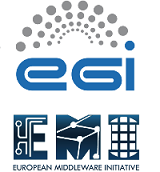Speaker
Conclusions
The training will include extensive hands-on for the attendees to really experiment the solutions proposed. The attendees will acquire knowledge on different grid workflow languages and their practical use for enacting grid applications.
The execution environment will be based on the SHIWA Simulation Platform, accessible through a web portal. The attendees will be expected to come with their laptop to connect to the platforms. Reliable and reasonably fast ethernet connection (much preferably wired) to the Internet will be needed.
Overview
This workshop will provide user training for exploiting different grid-enabled workflow systems and create applications leveraging multiple interoperable systems. It will include:
1. Basics of grid workflows and application writing as workflows.
2. Introduction to different workflow systems.
3. Introduction to the SHIWA Simulation Platform that integrates a workflow repository and multiple workflow enactors.
4. Creation of multi-workflow applications using the SHIWA interoperability solution.
Attendees are expected to have only very basic knowledge of grid infrastructure usage. The workflow engines and SHIWA Platform provides a high level user environment hiding most technical details.
URL
http://indico.lpds.sztaki.hu/indico/conferenceDisplay.py?confId=6#2011-04-11
Impact
Workflow application are very widely used to enact scientific applications on the grid infrastructure. Scientific workflow language provide high-level construct which are well suited to describe complex data-intensive applications. Workflow environment shield the end users from the low-level details related to the use of the grid infrastructure.
The examples in this training will be taken from the area of Life Sciences, but the tools presented have much wider application and can be of interest for any grid user community.
Description of the work
This workshop will introduce high-level production tools for end users. It will show how to use grid resources through workflow engines, rather than using the regular low-level command line interface for the grid.
Workflows provide abstractions to describe grid applications, and workflow systems can handle the applications enactment taking advantage of parallelism expressed in the workflow representation. Many different workflow systems, which language implement different parallel model of computations, have been developed and are in use today.
To cope with the multiplicity of workflow environments, and the emerging need to integrate existing workflows that have been developed using different workflow languages, the SHIWA project provides a multi-systems workflow execution platform and an interoperability solution. The platform currently supports four workflow systems: Askalon, MOTEUR, P-GRADE and Triana. It provides a repository for publishing and sharing workflow applications. Workflows from different systems can be nested to compose new applications, using existing workflow components.
The workshop will provide training for using some of the workflow systems supported and use the SHIWA platform. Reuse and composition of multiple workflows in an integrated application will be demonstrated.

